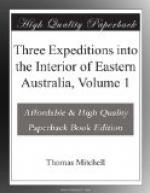We found in the course of a ride of twenty miles from the camp a much better country for travelling over than that in the immediate vicinity of the lagoon. We crossed, at eleven miles, a line of ponds in a deep channel whereof the bank seemed the highest ground; and beyond them was a rich plain with a few clumps of trees; where the grass also was remarkably good. At twenty miles, the length of our ride, we fell in with a second chain of ponds, beyond which we saw another plain. We were delighted with the prospect of so favourable a country for extending our journey, and not less so with the apparent turn of the Gwydir, as indicated by its non-appearance in our ride thus far. It was obvious that the more this river turned northward the greater would be the probability that it might lead to a channel unconnected with that of the Darling—and terminate in some still greater water, or open out a field of useful discovery.
SMALL BRANCHES OF THE GWYDIR.
The direction of the channels we had already crossed however was somewhat to the south of west—and it was difficult to account for their waters otherwise—than by supposing that they came from the Gwydir.
MUCH FREQUENTED BY THE NATIVES.
We could trace their course to a remote distance by the smoke of the fires of the native population. The numerous marks of feet in the banks, with the abundant remains of mussels and bones of aquatic birds proved that human existence was limited to these channels; not only on account of water, but of those animals, birds, and fishes also, which are man’s natural prey.
In returning we explored the western termination of the lagoon on which we had encamped, and thus ascertained that it was not part of any channel of flooded waters. Beyond the lagoon was a plain, apparently subject to inundation, and bounded at the distance of some miles by a line of trees which, in all probability, defined the course of the Namoi.
January 16.
The party proceeded along the course I had traced the day before. The country as far as the first chain of ponds was full of holes, which evidently were at certain seasons filled with water; and the height to which the inundations rose was marked on the trunks of the trees by a dark stain which, to a certain height, seemed universal. Considering these proofs of extensive flooding, and the soft nature of the soil we were then crossing, it was obvious that a rainy season would render our return impracticable, at least with the carts. For the first time, and with great reluctance, we left the high ground behind us to traverse a region subject to inundation, without the prospect of a single hill to which we might repair in case of necessity. It was nevertheless indispensable that we should find the river Gwydir and cross it before we could hope to travel under more favourable circumstances.
RICH PLAINS.
Beyond the first channel we traversed an open plain of rich soil similar to that of the plains near Mount Riddell.




